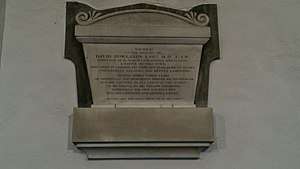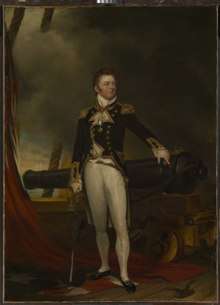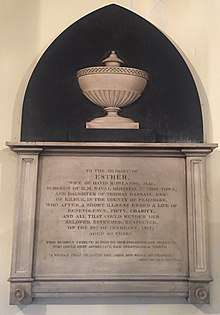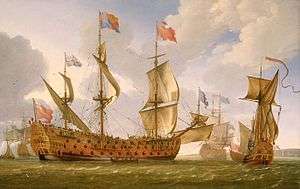David Rowlands (surgeon)
Dr. David D. Rowlands, M.D., F.R.S., F.A.S. (1778–1846) was a Welsh naval surgeon, who became the Inspector of H.M. Hospital and Fleets for the Royal Navy.[1] He had the distinction of being the Surgeon for the Royal Navy at Halifax when he treated the wounded of HMS Shannon, including Captain Philip Broke, after the renown Capture of USS Chesapeake during the War of 1812.[2][3][4][5] He was a Fellow of the Royal Society and a Fellow of the Antiquarian Society. He also supported the Governesses' Benevolent Institution in London (1844).[6]

Career
Rowland was born in Llanfihangel Penbedw. On 18 July 1795, Rowlands was assigned to be a surgeon.[7] He was the surgeon on ship Royal William before being posted to Halifax.[8] He became Hospital Surgeon at Halifax on 11 March 1812.[7]

He was the surgeon at Halifax when the wounded arrived from the capture of Chesapeake by HMS Shannon on 1 June 1813. Captain Broke received a deep cut to his scalp from a sabre. On 6 June Shannon arrived in Halifax and the following day the surgeon of Shannon, Alexander Jack, recorded that Broke was cared for at the house of the Commissioner the Hon. Philip Wodehouse and the care fell upon Dr. Rowland, the Surgeon, Royal Naval Hospital. (He reports that Rowland was assisted by Duncan Clarke.) Rowlands reported:
- ”I found Broke in a very weak state, with an extensive sabre wound on the side of the head, the brain exposed to view of three inches or more; he was unable to converse save in monosyllables.”[9]
Three weeks later at Halifax, 26 June 1813, Broke wrote his wife,
- “Dr. Rowland thinks it best not to hurry the closing up of my wound in the head, but it will, I think, be covered in a week more.”[5]
In 1819, after Halifax, he was posted to the Chatham Dockyard on January 1820 to 1838 and the Sheerness Dockyard (1831).[10][11]
On 23 November 1841 he was assigned Inspector of H.R. Hospitals and Fleets.[12] He lived at No. 28 Grosvenor Place until 1845.[13]
Rowlands died at his home No. 57 Wimpole Street, London, and was buried in the tomb of his parents at St. Mary’s Church (1846).[6] He also has a tablet to his memory in the church.[14][15]
Family

He married Esther Hassel at Llanfihangel Penbedw, near Cardigan on 2 May 1812. He then returned with her to Halifax, where he was the Surgeon of the Naval Hospital.[16] She died five years later and he purchased a monument for his wife Esther in the St. Paul's Church (Halifax).[17][18][19][20][21][22][23][16] He married two more times.[24][25]
He purchased a silver plate for his sister that is in St Llwchaiarn's Church, Llanllwchaiarn (1832).[26]
He was later recorded as a "pluralist", holding two or more pensions or offices, which led to him being recorded in The Black Book Or Corruption Unmasked.[27]
Also see
Gallery
 Monument to 7 of Dr. Rowlands patients from HMS Shannon, Royal Navy Burying Ground (Halifax, Nova Scotia) (1813)
Monument to 7 of Dr. Rowlands patients from HMS Shannon, Royal Navy Burying Ground (Halifax, Nova Scotia) (1813) Dr. Rowland's ship Royal William
Dr. Rowland's ship Royal William Rowlands' home, 57 Wimpole Street, London
Rowlands' home, 57 Wimpole Street, London Esther Rowlands, Old Burying Ground (Halifax, Nova Scotia)
Esther Rowlands, Old Burying Ground (Halifax, Nova Scotia)
References
- Admiralty, Great Britain (April 28, 1845). "The Navy List". H.M. Stationery Office – via Google Books.
- Barton, Mark; McGrath, John (July 3, 2013). "British Naval Swords and Swordsmanship: _". Seaforth Publishing – via Google Books.
- Gleaves, Albert (January 28, 1904). "James Lawrence, captain, United States navy, commander of the "Chesapeake,"". New York [etc.] G.P. Putnam's Sons – via Internet Archive.
- Gwyn, Julian (January 28, 2004). "Ashore and afloat : the British navy and the Halifax naval yard before 1820". Ottawa : University of Ottawa Press – via Internet Archive.
- Brighton, John George; Broke, Philip Bowes Vere (January 28, 1866). "Admiral Sir P.B.V. Broke, Bart., K.C.B., etc. : a memoir". London : Sampson Low, son, and Marston – via Internet Archive.
- "Governesses'Benevolent Institution. Report of the Board of Management for ..." Edward Brewster. January 28, 1845 – via Google Books.
- "List of Flag Officers and Other Commissioned Officers". January 28, 1845 – via Google Books.
- "The Naval Chronicle, Containing a General and Biographical History of the Royal Navy of the United Kingdom, with a Variety of Original Papers on Nautical Subjects". Joyce Gold – via Google Books.
- p. 237.
- "The Lancet London: A Journal of British and Foreign Medicine, Surgery, Obstetrics, Physiology, Chemistry, Pharmacology, Public Health and News". Elsevier. January 28, 1831 – via Google Books.
- "The Lancet". J. Onwhyn. January 28, 1831 – via Google Books.
- Admiralty, Great Britain (April 28, 1845). "The Navy List". H.M. Stationery Office – via Google Books.
- "Governesses'Benevolent Institution. Report of the Board of Management for ..." – via books.google.ca.
- Turner, Ernest Richmond Horsfall (January 28, 1902). "Walks and wanderings in County Cardigan; being a descriptive sketch of its picturesque, historic, antiquarian, romantic and traditional features". Bingley, Yorks : Printed for the author by T. Harrison and Sons – via Internet Archive.
- [30th January 1846 the ‘Pembrokeshire Herald’ ]
- "The Naval Chronicle, Containing a General and Biographical History of the Royal Navy of the United Kingdom, with a Variety of Original Papers on Nautical Subjects". Joyce Gold – via Google Books.
- "The Naval chronicle : containing a general and biographical history of the royal navy of the United kingdom with a variety of original papers on nautical subjects". archive.org. p. 440. Retrieved 2017-03-10.
- "The Naval chronicle : containing a general and biographical history of the royal navy of the United kingdom with a variety of original papers on nautical subjects | To Dr Rowlands, On the death of his wife, Naval Chronicle, Vol. 37, p. 497". archive.org. Retrieved 2017-03-10.
- The Gentleman's Magazine. 121. 1817. p. 472. Retrieved 2017-03-10.
- Ashore and Afloat: The British Navy and the Halifax Naval Yard Before 1820 By Julian Gwyn, pp. 50–53
- Medical Times. 13. J. Angerstein Carfrae. 1846. p. 320. Retrieved 2017-03-10.
- Esther Rowlands also has a memorial in St. Paul's Church (Halifax).
- Edgar Stanton Maclay, Roy Campbell Smith (January 28, 1894). "A History of the United States Navy, from 1775 to 1894". D. Appleton and company – via Internet Archive.
- Jones, Evan Davies; Vaughan, Herbert M. (Herbert Millingchamp) (January 28, 1920). "The Welsh book-plates in the collection of Sir Evan Davies Jones, bart., M. P. of Pentower, Fishguard; a catalogue, with biographical and decriptive notes". London : A. L. Humphreys – via Internet Archive.
- "The Gentleman's Magazine" – via books.google.ca.
- p.69.
- "The Black Book Or Corruption Unmasked, Being an Account of Places, Pensions and Sinecures, the Revenues of the Clergy and Landed Aristocracy, the Salaries and Emoluments in Courts of Justice and the Police Department Etc". John Faiburn. January 28, 1823 – via Google Books.